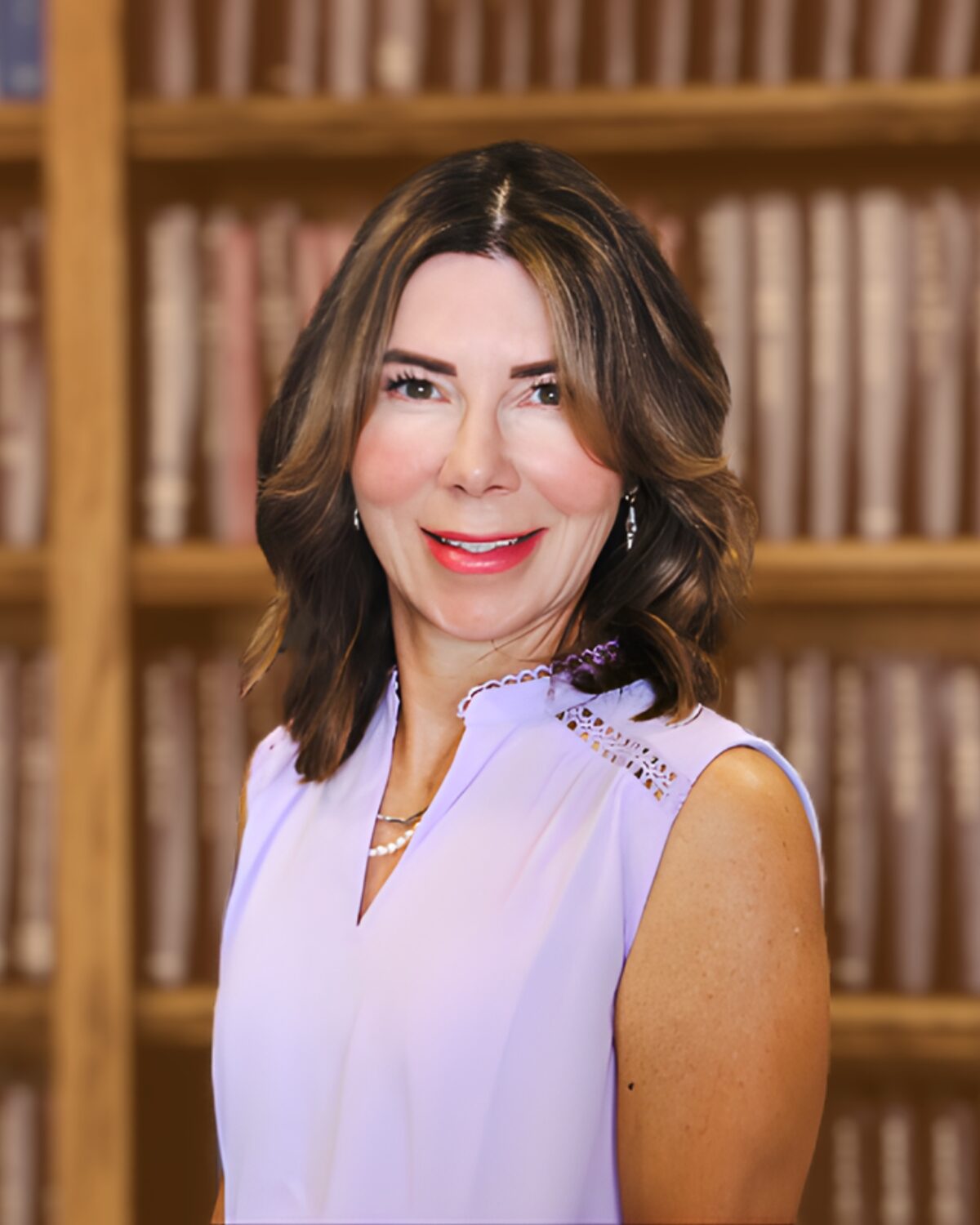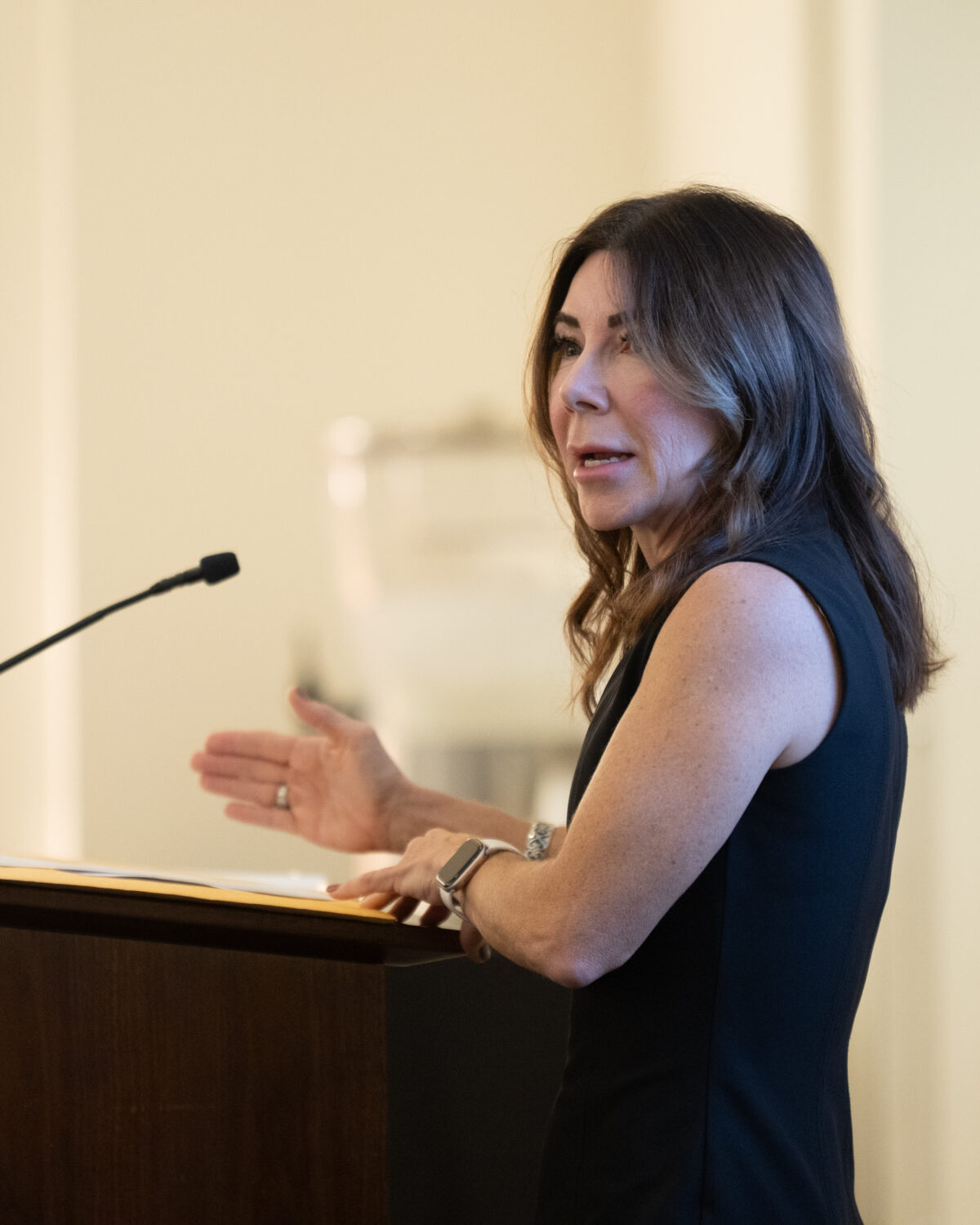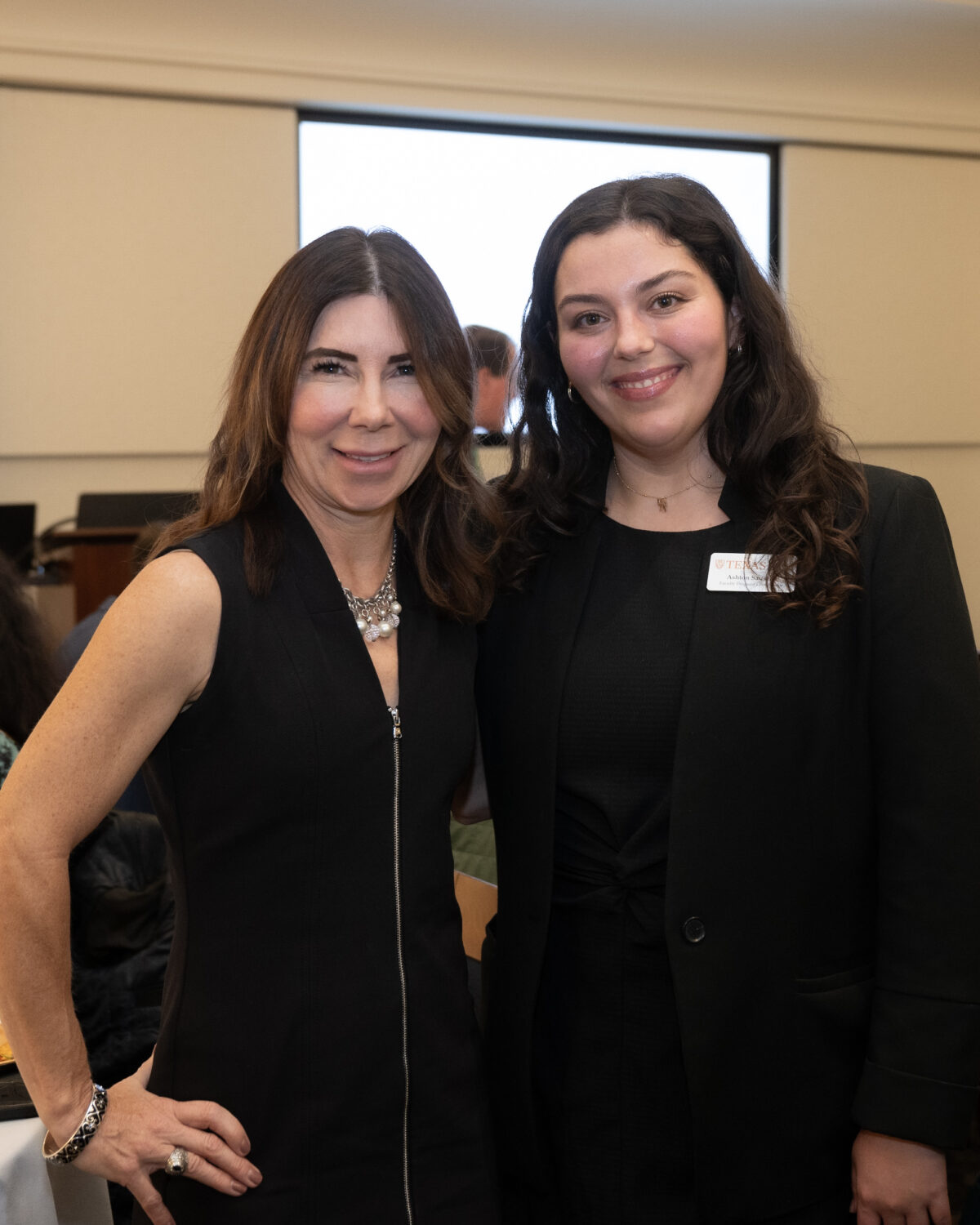
From a young age, Rachel VanLandingham ’00 saw the military as a life-changing opportunity. Inspired by her father, who earned a full ROTC scholarship and often spoke of the doors the Army opened for him, she saw a path that could take her beyond her hometown of Toledo, Ohio. When her parents couldn’t afford the small liberal arts college she dreamed of, the Air Force offered a free education. VanLandingham was sold.
Over the next several years, she followed in her father’s footsteps, earning multiple degrees—including her juris doctor from Texas Law—while serving in the Air Force. Her distinguished 24-year military career, with stints from Afghanistan to South Korea and stops in between, included serving as a senior legal advisor on the international law of armed conflict, military prosecutor, criminal defense attorney, appellate defense attorney, and nuclear surety inspector.
As Chief Legal Advisor for International Law at U.S. Central Command—which oversees U.S. military operations, security cooperation, and crisis response in the Middle East—she guided military operations through the complex legal landscape of the wars in Afghanistan and Iraq, providing crucial counsel on operational and international law that shaped strategic decisions in the field. As the Command’s Chief Liaison to the International Committee of the Red Cross, she championed stronger procedural safeguards for detainees in U.S. custody. She was also instrumental in passage of the most sweeping changes to the military justice system since the Uniform Code of Military Justice was established in 1950.
VanLandingham retired from active duty in 2012 as a lieutenant colonel.
We recently caught up with the alumna, who’s now molding young legal minds as co-associate dean of research and Irwin R. Buchalter Professor of Law at Southwestern Law School in Los Angeles. She teaches criminal law, constitutional criminal procedure, and national security law and is a frequent media commentator on military law.
How did your military career overlap with your education?
I went to the University of Maryland for a master’s in public management with a national security focus. I wanted to be a pilot, but my eyes were too bad and, at 5 feet and three-quarters of an inch, I was too short and couldn’t get a waiver. But my first summer in Washington, D.C. was formative. I was being exposed to fascinating people in the national security world. I was a research assistant to retired Admiral Stansfield Turner, who’d been a CIA director and was writing a book on nuclear deterrence. My thesis advisor was Ivo Daalder, who later became the U.S. ambassador to NATO.

The Air Force sent you abroad, including to South Korea. How did your travels put the law onto your radar?
I went as a squadron section commander to a remote base on the tip of the Yellow Sea where we had nuclear weapons. It was an interesting place to be because the grandfather of the North Korean leader died, and we went on high alert.
I really liked working with the JAGs (judge advocate generals). They were nuanced and measured. They could see the gray in life, the bigger picture, and I was attracted to that. From there, I went to Italy for a position as a total quality management wing quality advisor, a role in which one reflects on where missions went wrong and makes improvements. I had no idea what “total quality management” was. My mom had to send me books from Barnes & Noble!
I moved on from that role to one helping our wing in Aviano, Italy get ready for the nuclear surety inspection it had every 18 months. It’s a huge deal. The report goes to the President. It was an incredible experience figuring out where things could possibly go wrong and making adjustments before the inspection. I had to read regulations and be very analytical. That, too, made me think about being a lawyer.
And then you took the LSAT in Italy.
As chief of protocol, one of my jobs was to take distinguished visitors out to eat in Italy, which was really fun. But it was much more than that. It was to show them why our base needed funding. President Clinton came several times. It showed me in real time how our government works. I tried once more for pilot training, but I could only get a waiver for my eyes or my height, not both, so I knew I truly was never going to fly. A mentor at the Academy told me about a military program that sent a few active duty officers to law school full time. My mom sent me another Barnes & Noble book, an LSAT test prep one this time, and I took the test in Rome. I ended up doing well and got picked for the funded program. I left for Austin that summer.
Once you were at Texas Law, what was the experience like?
It was incredible. I’m so grateful. I got a top-notch legal education, knowing I had a job in the military after graduation. So, I really soaked up my classes, got legal experience in the summers, and lived life. It was a chance to appreciate Austin. I learned how to rock climb, got into cycling and rode my first 100-mile race, and ran a few marathons. Academic moments that stand out include a domestic violence clinic I took, a death penalty clinic with Professor Jordan Steiker, property law with Neil Netanel, and philosophy of the law and history of the law courses. My professors had such an impact.
I’m so grateful. I got a top-notch legal education, knowing I had a job in the military after graduation. So, I really soaked up my classes, got legal experience in the summers, and lived life. It was a chance to appreciate Austin.
After law school, what sorts of legal work did you do?
I went to Holloman Air Force Base in New Mexico because they had a fabulous female staff judge advocate—I really wanted to work for a woman. I was our chief prosecutor and got to litigate. Then I became a defense counsel. Being a prosecutor first makes you a better defense counsel.
Then, 9/11 happened, and I was deployed as staff judge advocate to Al Udeid Air Base in Qatar. I did a lot of contract law, the basic law of war, and training of air crews flying missions over Afghanistan on the basic law of armed conflict.
After that, I went to D.C. to do appellate defense, and later was the Chief of Recruiting for the Air Force JAG Corps. That’s where I met my husband; he was basically the Army equivalent.
What can you share about your work at U.S. Central Command?
It was the pinnacle of my career. I was the only Air Force JAG, the only female in the office, and it was super intense, but incredibly gratifying. I had the detention operations portfolio, which became really big. It was 2006, two years post-Abu Ghraib and we were figuring out lessons learned. One of my biggest jobs was to improve procedural safeguards for detainees.
When I showed up at Bagram Air Force Base in Afghanistan it was this old Soviet-era aircraft hangar, dark and dismal, black mold on the walls and big cages with 18 to 20 men in each. We held people who should never have been there, and we were not giving folks procedural safeguards. I put together recommendations for improving that, but ran into a lot of “no’s” until the Department of Defense got sued by the Center for Constitutional Rights on behalf of a detainee in Bagram. Suddenly, there I was in D.C. meeting with White House counsel. They were amenable, and I wound up playing a role in getting substantial procedural safeguards ordered by the Pentagon for detainees in Afghanistan. At the time, I didn’t realize what I’d been part of, but looking back, it was a huge step forward for both fairness and operational success.
That was a major accomplishment. So, from there, how did you get into teaching the law?

I took a position at the Air Force Academy. I wanted to go back and change the place. It had been a really abusive, toxic place to be as a young woman in the 1980s. I was a victim of sexual assault, but even more than that, the harassment and emotional abuse many of us endured had lasting impact. Fortunately, the rest of the Air Force was not like that, and I was treated with great respect. And then, back at the Academy, I had the wonderful experience of seeing it had already changed so much.
I also wanted to think deeply about some of the legal experiences I had overseas, our lack of adherence to the law, and what that did to our mission—at the end of the day, it was really detrimental. Ultimately, I ended up at Southwestern. When I teach, it’s not about memorizing facts. I hate memorization, because anyone can do that. It’s about the critical thinking skills. What’s the context? Why are we learning this?
You’ve also been active in military justice reform. Can you talk about the change you helped usher in?
Part of the National Defense Authorization Act took prosecution authority for serious crimes—including sexual assault, rape, murder, manslaughter, kidnapping, and domestic violence—out of the hands of military commanders and placed it with independent military prosecutors. This was a historic shift. Commanders had too much discretion and conflicts of interest, especially around handling sexual assault cases. You needed to have someone objective and trained in looking at the facts making prosecutor decisions. After 10 years of trying, I helped get that passed in 2021 legislation.
What still needs to change?
The term “military justice” itself is an oxymoron. There’s no need to have an entirely separate system, but there’s a halfway step, that every prosecution—not just some crimes—should be handled by an independent military lawyer. Our service members deserve the best system we can give them, not a flawed one. And I do think it’s possible in the next 15 to 20 years to get all military crimes handled by this independent office.
